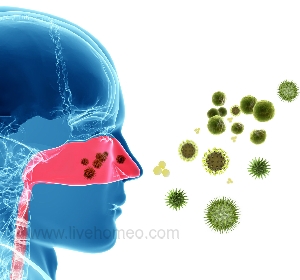Asthma is a chronic and incurable respiratory disease. It is a lung disorder where the muscles in the airways or bronchial tubes gets inflamed and become narrow. Due to inflammation and swelling the cells in the airways produce excess mucus which further narrows airways. Due to these narrowed airways people face difficulty breathing as the air can’t flow in and out properly. People with asthma face symptoms like cough, chest tightness, wheezing and shortness of breath, weakness or tiredness and so on. Asthma is caused due to several factors like allergies, genetic factors, pollution, smoking, exposure to chemicals and respiratory infections. When people face asthma due to allergies, it is called as allergic asthma. Several allergens like smoke, dust, pet dander, pollen and several others triggers asthma attack. When asthma people inhale any strong substances, their airways become irritated and get inflamed.
Cold weather triggers asthma and worsens the symptoms and people with asthma experience severe symptoms during cold weathers. Asthmatics mostly have asthma attacks or face severe symptoms during night times and in the early mornings when the weather is cold.

Asthma can attack people of all age groups, from children to elders. Asthma is classified into different types like a topic asthma/childhood asthma, occupational asthma/adult asthma, exercise induced asthma, cough variant asthma, night time asthma and severe asthma. In exercise induced asthma, exercises and physical activities triggers asthma attack in people. In people with asthma stress and smoking also triggers the asthma attack as smoking further damages lungs and narrows airways. Over weight also plays a crucial role in triggering asthma symptoms, hence people who are overweight and obese should shed some fats from their body. Few other conditions like sleep apnea, runny nose, sinus infections and reflux diseases worsens asthma condition and it is very important to get them treated. Asthma is a severe condition if left untreated or if gets worst can lead to several complications like sleeping disorders, pneumonia, failure of respiratory system, collapsed lungs and also leads to severe asthma which may not respond to the treatment.
Winter Effects on Asthma People
As discussed earlier, cold weather severely affects asthma people and triggers asthma attack. Asthma is one among the most 5 common health problems in winter. Generally our inside body and organs are warmer than the outside temperature and also the air we breathe is warmed before reaching the lungs. In winter and cold weathers people with asthma inhale cold air and they fail to warm up the breath before reaching the lungs. This cold breath affects lungs and leads to lung disorders and also inflames air ways. In winter the air is also dry, when people with asthma breathe this dry air, it irritates muscle tissues in the airways and leads to inflammation. Usually in winter due to cold weather people stay indoors and this increase their risk of allergies. When people stay indoors they come in contact with several allergens like pet dander, dust mites and others and this leads to a condition called allergic asthma. Along with these in winters people generally have cold, flu and other seasonal illnesses which also trigger asthma attacks. In winter several physical factors like stress and anxiety also plays a crucial role in worsening asthma symptoms. In winter people with asthma should be very careful especially the children and elders, as they have weak immunity and are more prone to several health illnesses. People need to take extra care in winter to stay healthy and avoid health illnesses. Asthma is a serious disease and if left untreated it can be life threatening also.
Asthma Disorders Control Tips
Even though asthma is an incurable disorder, by following few tips one can control and manage the symptoms and also prevents worsening of the disease. Here are few asthma control tips which helps in controlling the symptoms.
- Avoid contact with allergens and especially stay away from pet dander which further worsens symptoms of allergies.
- Wear appropriate winter wear and cover yourself to avoid seasonal illnesses.
- Use air purifiers and keep your house clean and dry.
- Stay away from infected people with seasonal illnesses as these illnesses may worsen asthma symptoms.
- Exercise regularly and also stay hydrated by increasing intake of fluids and water.
- Adjust your room temperature as the weather at night times and early hours is very cold.
- Stay indoors in cold weather and practice several exercises
- Carry your inhaler always with you to avoid any emergencies.
- Have healthy diet, include soups which can also improve immunity.
- Cover your nose and mouth with appropriate clothing like scarfs, kerchiefs and so on during cold breeze.
- Quit smoking as it further damages your lungs and increases inflammation in airways.
- Control your alcohol consumption.
- Control physical factors like stress and anxiety as they can trigger asthma attack.
- Maintain hygiene and wash your hands frequently as it helps to avoid several infections and allergies in weather changes
- Go out during late hours when the weather is hot and warm
- Take your allergy doses and flu vaccine to avoid complications.
- Take your asthma prescriptions regularly without fail.
- Use saline sprays to keep your nasal passages clean and eliminate blockages.
- Get regular check ups as it helps to eliminate severe complications.
Homeopathy Treatment for Asthma Disorders
Homeopathy treatment for asthma disorders works very well in controlling the symptoms and eliminating the root cause of the asthma disorders like allergies, infections and so on. Homeopathy for asthma problems uses natural remedies which are safe, free from adverse side effects and also which are suitable to all age groups. Homeopathy treatment for asthma problems is prescribed based on the symptoms, complete examination and theory of individualization. Asthma successfully reduces the inflammation in the airways and also production of excess mucus. Homeopathy mainly focuses on improving immunity and treating several illnesses and for overall wellbeing. Homeopathy along with treatment also provides asthma disorders tips. These homeopathy tips for asthma helps to provide quick relief from symptoms and eliminates the occurrence of asthma attack.





